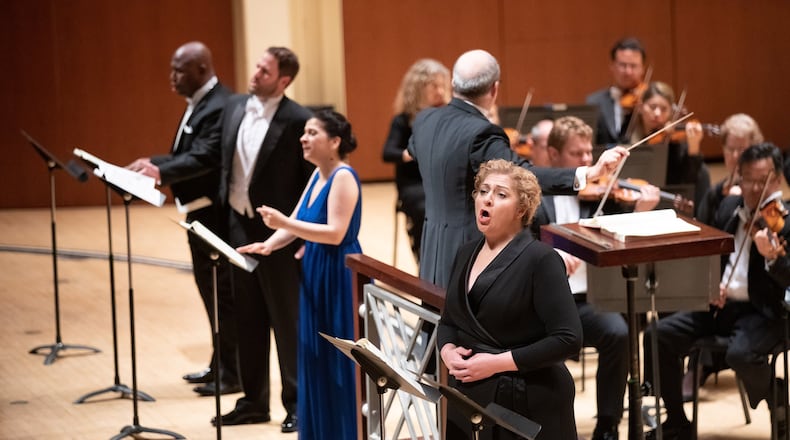In the opening to the second act of “Fidelio” Thursday at Symphony Hall, tenor Clay Hilley’s lamentation to God as the prisoner Florestan traversed a range of emotions. There was a tinge of anger and malice in his voice as he sang of being locked in a dank, dark cell for speaking out against a corrupt official. Most of all, his timbre was tinged with sad resignation.
“I dared to speak the truth boldly, and chains were my reward,” he bitterly spat out during his opening aria.
Beethoven’s two-act operatic rescue story centers on Florestan’s wife, Leonore, and her bold plan to save his life and restore justice by embedding herself within the prison staff disguised as the errand boy Fidelio. Thursday night, music director Robert Spano led the Atlanta Symphony Orchestra, ASO Chorus and guest singers in a concert version of the opera in the final weekend of the 2018-2019 season.
The concert represented the end of the orchestra’s two-year Beethoven/Bernstein exploration. The pairing, feting and juxtaposition of Bernstein and Beethoven works for the past two years has been a successful, but sometimes curious, exploration of two compositional titans.
Hilley’s powerful voice and expressive delivery perfectly complemented soprano Christine Goerke, a true bravura and exciting Leonore, who easily stood out as the star of the performance. The rest of the principal cast included soprano Laura Tatulescu, returning to the ASO after a triumphant performance of Mahler’s Symphony No. 2 to open the 2015-2016 season; bass Morris Robinson and baritone Nmon Ford, both Atlanta favorites; bass Arthur Wooley; and tenor David Walton. These singers performed well and each had shining moments of vocal brilliance.
In an early song, “Mir ist so wunderbar,” Wooley, Tatulescu, Walton and Goerke sang a joyful and expressive quartet, skillfully blending their voices for a rich ensemble sound. For his part, Ford sang the corrupt official Don Pizarro with delicious devilishness, deftly toeing the line between evil villain and outsized caricature. Throughout, the singers excelled in smaller pairings, most notably duets between Tatulescu and Goerke.
The ASO’s performance of “Fidelio” is part of Spano’s years-long series of concert presentations of opera. The orchestra is on stage, the chorus on risers and the singers read their parts from music stands, with limited acting between them. This version of “Fidelio” also cuts out most of the dialogue between songs, keeping the audience up to speed with projected narration, which moves the story along. The arrangement puts the focus on the music, letting the orchestra become a character on the opera stage. Playing boldly – sometimes with fire, in other spots with sweetness – the orchestra could nonetheless cover some of the smaller voices on stage. At the rear of the stage, on risers, the ASO Chorus sat silently for large portions of the opera, but true to form, their singing proved to be worth the wait. In Act 1, the men of the ASO Chorus, as prisoners, sang a lovely paean to fresh air and springtime. Act 2 incorporated the full ensemble for sublime passages of forceful – and very loud – singing.
Beethoven’s opera is relevant today both as entertainment and, sadly, as a commentary on current events. As Spano’s downbeat hit in Atlanta, the New York Philharmonic was unveiling a re-imagination of “Fidelio” by Pulitzer Prize winner David Lang. His “prisoner of the state” takes songs and themes from Beethoven’s work and, judging from previews of the songs on YouTube, makes the political undertones more overt. While the ASO programmed “Fidelio” years ago as a satisfying ending to their Beethoven/Bernstein project, the happy coincidence of performing the opera during the world premiere of Lang’s work adds another layer of importance to this weekend’s Atlanta concerts.
CONCERT REVIEW
Atlanta Symphony Orchestra
8 p.m. Tonight. $22-$55. Symphony Hall, 1280 Peachtree St. NE, Atlanta. 404-733-5000, atlantasymphony.org.
About the Author
Keep Reading
The Latest
Featured


